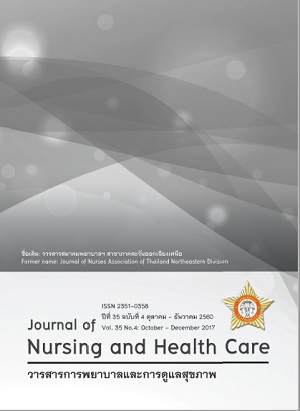บทบาทการดูแลผู้ป่วยระยะสุดท้ายของอาสาสมัครสาธารณสุขประจำหมู่บ้าน และพระสงฆ์ ร่วมกับพยาบาลวิชาชีพในพื้นที่ตำบลนาฝาย อำเภอเมือง จังหวัดชัยภูมิThe Role of Palliative Care with Village Public Health Volunteer and Buddhist Monks together with Registered Nur
คำสำคัญ:
บทบาทการดูแลผู้ป่วยระยะสุดท้ายตามวิถีแบบพุทธ อาสาสมัครสาธารณสุขประจำหมู่บ้าน(อสม.) พระสงฆ์ พยาบาลวิชาชีพ, the role of palliative care in Buddhism ways village public health volunteers buddhist monks and registered nurseบทคัดย่อ
การวิจัยเชิงบรรยายเพื่อศึกษาบทบาทการดูแลผู้ป่วยระยะสุดท้ายของอาสาสมัครสาธารณสุขประจำหมู่บ้านและพระสงฆ์ ร่วมกับพยาบาลวิชาชีพโรงพยาบาลส่งเสริมสุขภาพตำบลนาฝาย ตำบลนาฝาย อำเภอเมืองจังหวัดชัยภูมิ ผู้ร่วมวิจัยประกอบด้วย อาสาสมัครสาธารณสุขประจำหมู่บ้านที่ให้การดูแลผู้ป่วยที่บ้าน จำนวน 45 คน พระสงฆ์ จำนวน 3 รูป และพยาบาลวิชาชีพจากโรงพยาบาลส่งเสริมสุขภาพตำบลนาฝาย จำนวน 2 คน เครื่องมือที่ใช้ในการวิจัย ได้แก่ แบบทดสอบความรู้เกี่ยวกับการดูแลผู้ป่วยระยะสุดท้าย ทัศนคติของอาสาสมัครสาธารณสุขประจำหมู่บ้านต่อการดูแลผู้ป่วยระยะสุดท้าย การสังเกตแบบมีส่วนร่วม บันทึกภาคสนามแบบสัมภาษณ์แบบเจาะลึก เทปบันทึกเสียง และแบบประเมินความพึงพอใจของผู้ป่วยและญาติ ระยะเวลา ระหว่างเดือนพฤษภาคม พ.ศ. 2557 ถึงเดือนมีนาคม พ.ศ. 2558 วิเคราะห์ข้อมูลเชิงคุณภาพใช้การวิเคราะห์เนื้อหา ข้อมูลเชิงปริมาณวิเคราะห์โดยใช้สถิติเชิงพรรณนา ผลการวิจัย พบว่า 1) อาสาสมัครสาธารณสุขประจำหมู่บ้านมีบทบาทสำคัญในการดูแลผู้ป่วยระยะสุดท้าย ส่วนพยาบาลวิชาชีพมีบทบาทให้การสนับสนุนและมีส่วนร่วมในกรณีที่มีต้องการการดูแลที่ยุ่งยากซับซ้อน 2) ความรู้ของอาสาสมัครสาธารณสุขประจำหมู่บ้านในการดูแลผู้ป่วยระยะสุดท้าย ก่อนและหลังดำเนินงาน มีความแตกต่างกันอย่างมีนัยสำคัญ(P < 0.01) ส่วนทัศนคติของอาสาสมัครสาธารณสุขประจำหมู่บ้านต่อการดูแลผู้ป่วยระยะสุดท้าย พบว่า อาสาสมัครสาธารณสุขประจำหมู่บ้านมีทัศนคติต่อการดูแลผู้ป่วยระยะสุดท้าย ก่อนและหลังดำเนินงานไม่แตกต่างกัน 3) บทบาทการดูแลผู้ป่วยระยะสุดท้ายอาสาสมัครสาธารณสุขประจำหมู่บ้านให้การดูแลผู้ป่วยระยะสุดท้ายตามวิถีแบบพุทธร่วมกับพระสงฆ์ 4) ความพึงพอใจของญาติและผู้ป่วย ส่วนใหญ่มีความเห็นว่า ดีใจที่พระมาเทศนาให้ทางสว่าง ได้มีโอกาสทำบุญ จากที่รู้สึกไม่ดีและทรุดลง กลับมีกำลังใจต่อสู้กับการเจ็บป่วย จากการประเมินความพึงพอใจ พบว่า ส่วนใหญ่มีระดับความพึงพอใจในระดับมากเห็นว่า การช่วยเหลือผู้ป่วยระยะสุดท้ายตามวิถีแบบพุทธ ของอาสาสมัครสาธารณสุขประจำหมู่บ้านและพระสงฆ์ช่วยให้ทางสว่างแก่ญาติและผู้ป่วย โดยเฉพาะปัญหาทางด้านจิตใจ และจิตวิญาณ
The purpose of this discriptive research aimed to study the role of the nursing duties for the terminal stage patients performed by the village public health volunteers and Buddhist monks working with registered nurses from Tambon Na Fai Health Promoting Hospital, in Na Fai Sub-district, Mueang Chaiyaphum District, Chaiyaphum Province. The target groups are 45 the village public health volunteers taking care of terminal stage patients at home , working with 3 Buddhist monks and 2 registered nurses from Tambon Na Fai Health Promoting Hospital. Tools used in the research are achievement tests on attitude towards terminal stage patients against the village public health volunteers who have roles in palliative care, participative observation methods, field records, depth interview, voice records and questionnaires searching the satisfaction made by the patients and their relatives after being taken care for some times. The duration of research is from May 2014 to March 2015. The information was analyzed to seek the contents and the quantitative information was analyzed using the descriptive statistics.
The results showed that 1) the village public health volunteers have important roles in palliative care while the registered nurses take roles in supporting either tools or equipment and take part in complicated cases; 2) Meanwhile the knowledge pre- and post-action was much different with significant meaning (P < 0.01). Meanwhile the attitude of the village public health volunteers towards taking care of the terminal stage patents both pre- and post-action was not different. 3) The Role of palliative care in Buddhism ways. there is the activity cooperates the Buddhist monks 4) From the evaluation of satisfaction, he satisfaction of the patients and their relatives, most of them presented their positive opinions from being given preach by monks and from having good opportunity in making merit. Some of them who had felt worse and collapsed became spirited to fight against the disease. It has been found that the satisfaction levels are high and some of them think that the assistance given to palliative care with Buddhism ways by the village public health volunteers and monks makes the relatives and the patients become better particularly in mental and spiritual ways.



